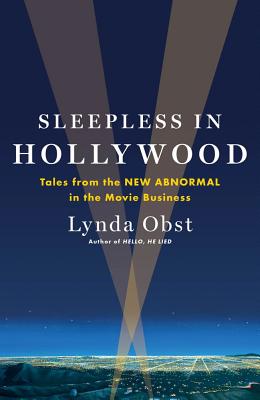Film producer Lynda Obst's career has had more twists and turns than a big-budget action movie -- which is not the sort of movie she makes. (Not yet anyway, but more on that later.)
Obst started her career as associate producer on Flashdance and made a film every year or two from the early 1990s through the early 2000s -- One Fine Day with George Clooney and Michelle Pfeiffer, Hope Floats with Sandra Bullock, Contact with Jodie Foster, and iconic romantic comedy Sleepless in Seattle with Tom Hanks and Meg Ryan.
In 2001, Paramount Pictures greenlit her rom-com How to Lose a Guy in 10 Days starring Kate Hudson and Matthew McConaughey. It opened No. 1 at the box office in February 2003, was Paramount's second-highest grossing movie that year, and is one of the 25 highest-grossing romantic comedies of all time.
Obst continued to read scripts and develop budgets for the kinds of films she had always made --- smart, character-driven, medium-budget comedies and dramas. A year after How to Lose a Guy in 10 Days, though, Paramount had not greenlit her next film.

"Suddenly, I was getting blank stares when I asked to go to hire directors," Obst said in our recent interview. "My son (talent manager Oly Obst), who is incredibly smart, said to me, 'Mom, trying to get a movie made because it's good is so 2003.'"
By the late 2000s, the industry was in a full-on reboot: DVD sales dropped by more than half from 2007 to 2010 as consumers turned to much-less-profitable streaming services like Netflix. Studios unloaded many production deals in the wake of the 2007 writers' strike and started making fewer films.
In her new book, Sleepless in Hollywood: Tales from the New Abnormal in the Movie Business (Simon & Schuster), Obst explains the revolution through interviews with studio executives, producers, writers, etc. The book grew out of her own search for answers.
"I set off to figure out what the hell was going on because I couldn't figure it out myself," Obst said. "I didn't understand why I wasn't able to get the same kinds of movies made that I was able to get made the first half of my career."
The book is both an outstanding work of reporting about how Hollywood evolved from a film-driven American industry to a brand-driven global enterprise and a personal account of how those changes drove Obst's film career from studio to studio, and from film to television and back.
Obst is Thriving in the "New Abnormal."
Nothing has ever been normal in Hollywood, Obst says. She calls the days before the massive upheaval the "Old Abnormal" and the period since then the "New Abnormal." Obst recovered -- as did Hollywood -- and is thriving in the New Abnormal. She has more projects in pre-production and production than at any other time in her career and in all three areas where Hollywood is trending: tentpoles (big-budget films), tadpoles (small-budget indie films), and television.

Obst's just-announced tentpole film is the sci-fi epic Interstellar, which she will co-produce with director Christopher Nolan and writer Jonathan Nolan for a November 2014 release. The film will star Anne Hathaway, Jessica Chastain, Michael Caine, and Matthew McConaughey, who Obst worked with on both Contact and How to Lose a Guy in 10 Days.
"We're all in a very happy cone of silence about Interstellar," Obst said, declining to elaborate on the film's premise or other tidbits.
For her tadpole film, Obst has financing, a script, a director, and is in casting for How to Get a Guy in 10 Days, an indie kind-of-sort-of sequel to How to Lose a Guy in 10 Days. The hottest property a producer can own, Obst says, is a franchise with pre-awareness.
"We're trying to take the notion of preawareness" -- the built-in buzz that a well-known brand brings to the table -- "of How to Lose a Guy in 10 Days' fans and say, this is something like that. It's not exactly that," Obst said. "But it's a movie in that vein. It's not a reboot, it's not a sequel, but it's a movie in that tradition."
In television, Obst is an executive producer on Hot in Cleveland -- the popular TV Land series now in its fourth season was Obst's idea -- and has a series in production called Helix that will air this winter on Syfy.
Romantic comedies are (mostly) out.
American romantic comedies lost favor with the major studios because they don't have blockbuster potential at home and don't sell as well in places like China and India. In the last two years, the only romantic comedy to gross more than $100 million at the U.S. box office was Silver Lining Playbook -- and much of that was due to Oscar buzz and a Best Actress win by Jennifer Lawrence.
"There are cultural nuances that don't travel. Broad comedies play because falling on a banana peel is funny in every culture, but nuance -- cultural nuance, or wit -- are peculiarities. They don't travel. So-called "writing" -- wit and nuance -- doesn't travel," Obst said.
"Broad comedy travels, which is why you saw Hangover play [internationally], which is why you saw Horrible Bosses play to a certain extent, and why you saw Bridesmaids surprise everybody and play so well."
That has pushed romantic comedies into smaller-budget indie productions like Friends with Kids, which Jennifer's Westfeldt and John Hamm made for less than $10 million, and (500) Days of Summer, which had a budget of $7.5 million.
Blockbuster franchise films are in.
There are new rules to making a box-office hit in Hollywood, and they aren't complicated: You need a franchise, you need pre-awareness, and you need international appeal. And if -- if, if, if, if, if -- you pick the right project, you join the billion-dollar club.
Notice what wasn't in those rules: making a good movie. Decent reviews are optional. Transformers: Dark of the Moon and Pirates of the Caribbean: Dead Man's Chest each grossed more than $1 billion worldwide despite generally bad reviews.
In 2012, Walt Disney Pictures made a big bet on John Carter -- which, you may not know, was based on the John Carter of Mars series of books that Edgar Rice Burroughs wrote roughly a century ago -- and it lost $200 million. It had no fan base, no bankable stars, and no social-media buzz. It was the biggest flop in box office history.
"I think the problem was that it wasn't an IP (intellectual property) worthy of being made," Obst said. "I don't think science geeks were interested in it, and I don't think fantasy geeks were interested in it. I'm a science geek; I didn't want to go."